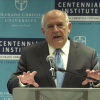My wife, who was raised Catholic, is an atheist like me, but she thinks I’m different. Unlike her, she says I’m a religion-hating atheist who was indoctrinated at a young age by my godless parents.
I tell her it’s not true; I respect religious people. It’s the religious hypocrites and dangerous faith-filled ideologues who bother me, and there have been so many throughout human history that you have to conclude that humanity would be better off without religion. But religion helps people cope and gives them a common moral code, says my wife, and we’ve been stuck there for eternity.

In his new book, Getting Over Jesus: Finding Meaning and Morals without God, Ari Armstrong gives me everything I need to finally win the argument with my wife (maybe not with her but with other people).
But the book isn’t written for atheists like me. It’s for people like Armstrong was as a young man. In high school, he obsessively tried to convert nonbelieving friends, took the Bible literally, and crusaded against abortion. Over time, he struggled with “agonizing self-doubt, guilt, and loneliness” as he slowly abandoned his deep Christian faith.
“I was profoundly afraid that my doubts about religion were planted by Satan,” he writes.
But by the time he left Pepperdine College, he’d transformed into an atheist.
“I wrote this book primarily for people who were raised Christian but who are questioning their faith,” writes Armstrong. “… My aim is to help make the transition from religious belief to secularism a little easier and to help point the way to finding truth, meaning, and morals in the natural world.”
As such, this is exactly the book much of America needs.
Armstrong, who’s a local public intellectual and a columnist for right-leaning Complete Colorado, argues that if America were filled with atheists, who rely on a bedrock of reason and secularism to guide their lives, we’d have a better shot at getting along with each other in politics and being happy ourselves.
He writes that relying on faith, even if you experience it and have confidence in your belief, is “extremely dangerous.”
One example he points to is the Jan. 6 insurrection of the U.S. Capitol, in which religion “played a large role.”
“That most American Christians opposed the assault and were horrified by it does not change the fact that many of the people who invaded the Capitol were motivated by their religious beliefs and by faith-based beliefs more generally,” writes Armstrong. “Because of the cultural particulars of the United States, this faith manifested in Christian forums. My point is not that Christianity necessarily breeds authoritarianism, but that aspects of Christian theology, starting with its reliance on faith, inspire authoritarian tendencies in many adherents.”
“Christianity is fundamentally about substituting ‘mysticism for reason and evidence,'” writes Armstong, “so in that sense these Trumpists are essentially Christian. Their religious faith just takes a little different form relative to the norm.”
Armstrong’s blunt attacks on religion are found throughout his book’s dissection of Christian tenets and Bible-based “defense mechanisms” and his presentation of reasonable secular alternatives in 10 short chapters over 190 pages. It seems like it’s missing a non-philosophical, and more practical, how-to chapter, maybe with ten concrete steps you can take to start your journey away from Christianity. I’m not sure what that would look like, but it might start with something like: 1. Go on a church fast for a month, 2. Have a cup of coffee with a happy atheist, 3. Write your own explanation of how a loving God could allow so much human misery in the world… .
Armstrong’s detailed argument for atheism is convincing. Of course, I’m an atheist, but even if I weren’t, Armstrong’s plain writing about heavy concepts makes the book highly readable — and provides an unexpected philosophical haven from the graphic onslaught of crises surrounding us.
Armstrong goes out of his way repeatedly to say that atheism is not a panacea and that religious people can be happy and reasonable too.
“Many Christians lead moral, well-adjusted, successful lives,” he writes. “My point, then, is not that Christianity necessarily or even usually harms a person’s life. Insofar as Christians lead moral lives, it is despite their religious faith, not because of it.”
Maybe that sounds a bit headstrong, but you need an edge when you take on God.
Still, Armstrong counsels, “Being an atheist does not mean being an asshole about it.”
That’s how I was in my twenties when I pounced venomously on anyone who crossed my path and admitted to a belief in God.
I’m less vehement now, but Armstrong’s book convinced me that I should be more evangelical about atheism.
As he says, the joys and benefits of life — individually and communally — are best found through reason, which is the basis for atheism and secularism.
“We live our best lives by embracing reality,” he writes.




